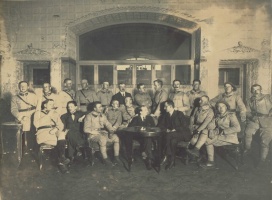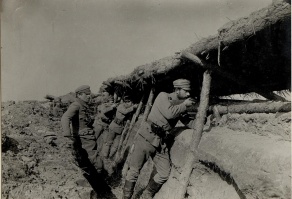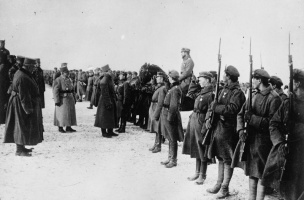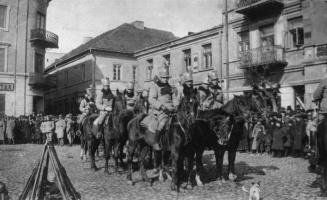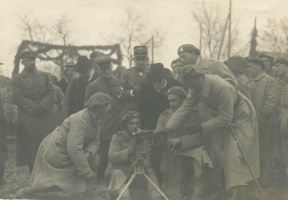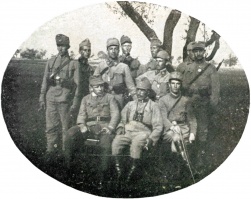Introduction↑
Contemporary analysts were convinced, and many historians have agreed, that the population of Austria-Hungary consisted of nations, and that conflicts between them were the main cause of its ultimate demise. According to this view, nations inevitably gravitated towards independence; the First World War enabled them to attain it by fatally weakening the forces keeping the empire together.
However, recent research has questioned this view. Not only were people’s identifications far more complex and the effects of nationalisms limited but nationalisms were also rarely in conflict with the Habsburg state. On the contrary, most nationalists sought to attain their goals within the imperial framework. This article will show the development of Habsburg nationalisms during the war and the effect of wartime developments on national identifications and the relations between nationally construed groups.
Before the War: A Multinational Empire?↑
As nationalism, an ideology that defines nations primarily as political communities of all the people living in an area, reached the Habsburg Monarchy at the turn of the 19th century, contemporaries formulated several visions. Some thought that all the inhabitants of the monarchy should become a single nation, while others supported nations comprising the inhabitants of one province.[1] Soon, however, ethnolinguistic conceptualisations of nations prevailed throughout the Habsburg Empire. Nationalists declared that speakers of a certain language objectively belonged to the eponymous nation even if they did not identify with it.
In the second half of the 19th century, the belief that all inhabitants of the Austrian Empire belonged to one of the ethnolinguistic nations had spread among the middle classes and was acknowledged by the state. Despite minor differences of opinion, the classification of languages and nations also stabilised. The statistical survey of the Common Army divided officers and soldiers into eleven nations: Germans, Hungarians, Czechs and Moravians, Slovaks, Poles, Ruthenes, Slovenes, Serbs and Croats, Bulgarians, Romanians, and Italians.[2]
After the Compromise of 1867, the Austrian legal framework guaranteed equality to these nations, while in Hungary, which defined itself as a nation-state, laws protected the linguistic rights of non-Hungarian nationalities. In practice, however, Hungarian nationalists increasingly tried to restrict minority languages and Magyarise the population, while in the Austrian part of the monarchy, speakers of non-German languages occasionally struggled to gain full equality in education, the judicial system, and administration.[3]
At the turn of the 20th century, nations became an important mode of group-building, as nationalist activities and state policies promoted identification with a nation. Sporadically, nationality became a legal requirement.[4] Nationalisms were able to mobilise the middle classes, and also an increasing number of workers and peasants. However, identification with a nation remained contingent and situational; while it was apparent during elections, censuses, nationally framed conflicts, and so on, it was often irrelevant or only relevant for some.[5] Nationalisms mostly coexisted with imperial patriotism and dynastic loyalty. Nationalists seeking full independence or incorporation into a neighbouring state were a small minority.[6]
The War Starts↑
However, there were reasons for concern. As Austria-Hungary mobilised during the Balkan Wars 1912-1913, some Czech-speaking reservists proclaimed that they would not go to war against their "Slav brethren". Enthusiasm for Serb victories was even more apparent among Habsburg South Slavs.[7] This caused unease in the military and political leadership; while the concerns about Pan-Slav, South Slav, Romanian, or Italian irredentism were not entirely unfounded, reactions sometimes bordered on hysteria.[8] Many generals and bureaucrats started believing that entire groups of citizens could not be relied on because of their real or presumed national affiliation. Traditional stereotypical national characterisations and hierarchies were being replaced by categorisations based on dubious assumptions about reliability and loyalty.
During mobilisation, these were mostly proven false. While there was no general enthusiasm for war, citizens reacted to events similarly and their national identifications hardly influenced their reactions. Even the supposedly "disloyal" Czechs rushed to enlist.[9]
Many Slav-speakers were less than enthusiastic about a war against Serbia and Russia, and some nationalists were already of the opinion that Austria-Hungary needed to be dismembered. Several prominent politicians, like Tomáš Garrigue Masaryk (1850-1937) and Ante Trumbić (1864-1938), emigrated and started lobbying for Austria-Hungary’s dissolution. Cesare Battisti (1875-1916), a member of the Austrian parliament, even joined the Italian army. Yet these were a minority; most nationalists could only envision a future within the Habsburg realm. They saw the war as an opportunity to affirm their loyalty and gain support for their political plans. Hoping that Austria-Hungary might back an independent Poland, Polish nationalists mobilized their volunteer paramilitary units; Polish Legions later fought as part of the Austro-Hungarian army. Ukrainian nationalists also formed a volunteer unit, the Sich Riflemen, which fought on the Eastern Front as part of the Austrian Landwehr.[10]
A Multinational Empire at War↑
Despite this, more or less spontaneous acts of popular violence – such as demonstrations and destruction of private property – against supposedly "unpatriotic" groups took place after the Sarajevo assassination.[11] More importantly, military and civilian authorities started persecuting presumed Pan-Slavs or Serbophiles. Prominent intellectuals, priests, politicians and even members of parliament, as well as humble workers and peasants, especially those who spoke Serbian and Ukrainian, were accused of espionage, treason, and similar offences and interned, imprisoned, or executed, often on spurious evidence. While the civilian courts retained at least a semblance of proper procedure, the army summarily executed several thousand Serbian and Ukrainian-speaking civilians suspected of spying or assisting the enemy near the front line. Similar actions took place against the Italian-speaking population after 1915.[12]
The suspension of many civil rights and the military control of the civilian administration in Austria – the so-called military absolutism – empowered those who felt that politics, especially nationalist politics, needed to be removed from governance.[13] German nationalists used the opportunity to settle accounts with their Czech or Slovene counterparts. The ministerial commission report from 1917 stated,
In Hungary, the situation was slightly different because the Hungarian government prevented a military takeover of the administration. Consequently, for instance, press censorship was less strict; yet for the non-Hungarian-speaking population, the difference was negligible. Hungarian nationalists used the powers at their disposal to indiscriminately persecute linguistic minorities including Serbian, Slovak, Romanian, and Ukrainian-speakers.[15]
In the army, pre-war notions about the loyalty of a particular nationality often influenced the interpretation of events, especially after several catastrophic defeats in the first year of the war. Officers and generals blamed soldiers classified as members of “unpatriotic” nations and their alleged unreliability for defeats that were in fact a consequence of deficient planning, supply problems, or uninspired leadership. Czech-speaking soldiers were perhaps the most often targeted, and the largely unfounded assumptions about their disloyalty resulted in punitive measures, including the dissolution of the 28th infantry regiment in April 1915.[16]
Mistreatment of predominantly loyal citizens, who often did not identify with a nation or did so only occasionally, had consequences. Firstly, together with worsening supply at home and the continued death toll at the front, it eroded the legitimacy of the state, which was increasingly seen as an entity unable or unwilling to take care of its citizens equitably. Secondly, it boosted identification with ethnolinguistic nations. Those Czech-speaking soldiers who did not identify with the Czech nation before the war, for instance, started identifying as Czechs precisely because they were continually categorised as such. Additionally, many soldiers first encountered speakers of other languages and speakers of their own language from other regions during the war; this raised awareness of the differences. Boundaries between nationally construed groups were often reinforced, and everyday disagreements were increasingly interpreted as conflicts between nationalities.[17]
1917 and 1918: Federalisation or Dissolution?↑
Similar processes could be observed in the civilian sphere. In camps, internally displaced persons evacuated from the war zones were categorised into national groups according to their language use, and welfare was gradually left more and more to nationalist organisations because the state was unable to organise it.[18] The effects were twofold: linguistically homogenous environments became more common, and nationalists often became the most important point of contact for the population. This was only compounded by the fact that the nationalists controlled local and provincial authorities, the political organs that most often interacted with civilians. All this furthered nationalisation and strengthened boundaries. For example, censors looking at correspondence noticed the animosity of Slovenes towards Germans, whom they perceived as privileged.[19]
In short, the ties that bound Habsburg society together were being severed, even if the process was slow and the outcome far from predetermined. Increased national identification did not necessarily include irredentism or support for an independent nation-state. Nationalism did not entirely replace other identifications, and it remained largely irrelevant in many situations.[20]
Yet, as the new emperor-king Charles I, Emperor of Austria (1887-1922) dismantled military absolutism in the last month of 1916 and the first months of 1917, he opened a space for radicalised nationalist politicians, for whom Austria-Hungary’s dissolution into independent nation-states – something the émigrés had been propagating for some time – increasingly became acceptable. While many citizens – regardless of their national identification – still preferred a reformed Habsburg state as late as the summer of 1918, political developments were mostly shaped by nationalist politicians who had by then ceased looking for a Habsburg solution. Emperor-King Charles and his ministers worked on reform plans but had almost no way to address or mobilise the population, which had been largely split into national camps.[21]
The movement towards dissolution gained additional impetus from Entente support for so-called national self-determination. Italy started championing the dissolution of Austria-Hungary along national lines after the defeat at Caporetto.[22] United States President Woodrow Wilson’s (1856-1924) Fourteen Points still only talked about “autonomous development”, but in the spring of 1918, the Entente began to favour dissolution and started actively supporting separatist nationalists; the promise of “national liberation” featured prominently in Entente propaganda; the aim was to accelerate the defeat of the Central Powers by knocking Austria-Hungary out of the war.[23]
The success of these efforts was limited, but not entirely absent. Some soldiers, non-commissioned officers, and officers deserted precisely because they felt that the Habsburg state could not secure a future for the nation they identified with. While most prisoners-of-war preferred to stay in the Entente camps, thousands joined the Italian army, the Czechoslovak Legion, the Yugoslav volunteer units, and so on. Not everybody joined because of nationalism – practical reasons sometimes played a part – and most volunteers likely came from a pre-war nationalist background. Yet anti-Habsburg nationalism clearly existed.[24]
The use of national self-determination as a guiding principle during talks for the Treaty of Brest-Litovsk gave it further legitimacy, especially following acknowledgement by the diplomats of the Central Powers.[25] Although German and Austro-Hungarian diplomats explicitly stated that self-determination could not apply to nationalities within their states, nationalists in Austria-Hungary disagreed. Ukrainian, Czech, and South Slav members of the Austrian parliament demanded that the Austrian government recognise their right to self-determination and decided to send their delegations to Brest-Litovsk.[26] Immediately thereafter, on 6 January 1918, Czech members of the Austrian parliament declared their support for an independent Czechoslovakia.[27]
As the military situation and living conditions deteriorated through the summer of 1918, even the emperor decided that the reorganisation of the Austrian half of the monarchy into a union of nation-states was the only solution. Yet the ensuing manifesto of 16 October (“Völkermanifest”) came too late. It was clear that the Central Powers were about to lose the war. Furthermore, the nationalists were convinced that they could attain their goals on their own. As Entente troops poured across the borders in late October, national committees were declaring independence and trying to control the territories they claimed.
Conclusion↑
While sources certainly suggest that national identification increased during the war, it was far from universal at the end of it. For many, peace, food, and repatriation, rather than federalisation or even independence, were the main priorities. Perhaps surprisingly, nationalisms still coexisted with dynastic loyalty. In late 1917 and early 1918, although most Slovene-speakers supported the May Declaration of 1917, which demanded the establishment of a South Slav state, they also explicitly stated that it should be ruled by the Habsburgs.[28]
Yet by then, nationalist leaders had other plans. Because of oppressive wartime policies, their attachment to Austria-Hungary was severely diminished. The Dual Monarchy was also losing the war, so reform made little sense; independent nation-states or integration into one of the existing ones seemed the only viable options. Consequently, even the German-speaking politicians largely gave up on the empire and opted for incorporation into Germany.[29]
Amplified national identification, reinforced boundaries between nationally defined groups, and the empire’s loss of legitimacy gave the nationalist leaders enough support among the population to claim a popular mandate for independence. While still present, imperial patriotism and dynastic loyalty had been sufficiently weakened by wartime events. There was also no organised political movement that could mobilise the remaining Habsburg loyalists; in the end, even the social democrats, who had mainly advocated for the continued existence of a large central European polity, aligned themselves with the bourgeois nationalists and their move towards independence.[30]
Austria-Hungary did not fall apart because it had been multinational. It did not even fall apart because of the somewhat strengthened national identification during the war. Apart from the Entente decision to dismember it, the crucial cause of its demise was that towards the end of the war, the nationalists, who had a virtual monopoly on politics, did not see the Habsburg state as a viable framework for the nations in whose name they putatively spoke. The unwillingness or inability of the emperor-king to offer an attractive alternative that could satisfy the nationalists and secure their continued support for the Habsburg state only pushed them further towards independence. Their ability to "translate" popular dissatisfaction with the catastrophic situation at the front and in the hinterland into national demands – and to simultaneously quell the imminent social unrest – secured enough popular support for the so-called national revolutions to proceed almost unopposed.
Rok Stergar, University of Ljubljana
Section Editors: Gunda Barth-Scalmani; Richard Lein
Notes
- ↑ Judson, Pieter M.: The Habsburg Empire. A New History, Cambridge et al. 2016, p. 63, pp. 87–89.
- ↑ Militärstatistisches Jahrbuch für das Jahr 1910, Vienna 1911, p. 145, 146.
- ↑ Stourzh, Gerald: Die Gleichberechtigung der Nationalitäten in der Verfassung und Verwaltung Österreichs 1848-1918, Vienna 1985; Varga, Bálint: The Monumental Nation. Magyar Nationalism and Symbolic Politics in Fin-De-Siecle Hungary, New York et al. 2016, pp. 13-17.
- ↑ Stergar, Rok / Scheer, Tamara: Ethnic Boxes. The Unintended Consequences of Habsburg Bureaucratic Classification, in: Nationalities Papers 46/4 (2018), pp. 575-591.
- ↑ Judson, Pieter M.: Guardians of the Nation. Activists on the Language Frontiers of Imperial Austria, Cambridge, MA et al. 2006; Zahra, Tara: Kidnapped Souls, Ithaca 2008; Zahra, Tara: Imagined Noncommunities. National Indifference as a Category of Analysis, in: Slavic Review 69/1 (2010), pp. 93-119.
- ↑ Cole, Laurence: Military Culture and Popular Patriotism in Late Imperial Austria, Oxford 2014; Unowsky, Daniel L. / Cole, Laurence (eds.): The Limits of Loyalty. Imperial Symbolism. Popular Allegiances, and State Patriotism in the Late Habsburg Monarchy, New York et al. 2007; Unowsky, Daniel L.: The Pomp and Politics of Patriotism. Imperial Celebrations in Habsburg Austria, 1848-1916, West Lafayette 2005.
- ↑ Plaschka, Richard Georg: Nationalismus – Staatsgewalt – Widerstand. Aspekte nationaler und sozialer Entwicklung in Ostmittel- und Südosteuropa, Vienna 1985, pp. 217-252; Skoko, Savo: Afirmacija ideje o ujedinjenju jugoslovenskih naroda u zajedničku državu za vreme balkanskih ratova 1912-1913 [Affirmation of the Yugoslav Idea during Balkan Wars 1912-1913], in: Stvaranje jugoslovenske države 1918, Belgrade 1983, pp. 89-99.
- ↑ Angelow, Jürgen: Der 'Kriegsfall Serbien' als Willenstherapie. Operative Planung, politische Mentalitäten und Visionen vor und zu Beginn des Ersten Weltkrieges, in: Militärgeschichtliche Zeitschrift 61 (2002), pp. 315-336.
- ↑ Hutečka, Jiří: 'Looking Like the Other Guys'. The 1914 Mobilization as a Masculine Experience in Czech Soldiers’ Writings, in: Revue des études slaves 88/4 (2017), pp. 699-714; Watson, Alexander: Ring of Steel. Germany and Austria-Hungary in World War I, New York 2014, pp. 90-92.
- ↑ Haid, Elisabeth: Galicia. A Bulwark Against Russia? Propaganda and Violence in a Border Region During the First World War, in: European Review of History: Revue européenne d’histoire 24/2 (2017), p. 203.
- ↑ Cole, Laurence: Questions of Nationalization in the Habsburg Monarchy, in: Wouters. Nico / Van Ypersele, Laurence (eds.): Nations, Identities and the First World War, London, 2018, p. 120.
- ↑ Cornwall, Mark: Traitors and the Meaning of Treason in Austria-Hungary’s Great War, in: Transactions of the Royal Historical Society 25 (2015), p. 123; Deak, John / Gumz, Jonathan E.: How to Break a State. The Habsburg Monarchy’s Internal War, 1914-1918, in: The American Historical Review 122/4 (2017), pp. 1105–1136; Haid, Galicia 2017, pp. 205-206; Moll, Martin: Kein Burgfrieden. Der deutsch-slowenische Nationalitätenkonflikt in der Steiermark 1900-1918, Innsbruck 2007; Überegger, Oswald: Der andere Krieg. Die Tiroler Militärgerichtsbarkeit im Ersten Weltkrieg, Innsbruck 2002.
- ↑ Cornwall: Traitors, p. 127; Deak / Gumz, How to Break a State 2017, pp. 1116–1119.
- ↑ Quoted in Pleterski, Janko (ed.): Politično preganjanje Slovencev v Avstriji 1914-1917. Poročili vojaške in vladne komisije [Political Persecution of Slovenes in Austria. Reports of Military and Governmental Commissions], Ljubljana 1980, p. 60 [translated by author].
- ↑ Judson, The Habsburg Empire 2016, p. 393.
- ↑ Lein, Richard: Pflichterfüllung oder Hochverrat? Die tschechischen Soldaten Österreich-Ungarns im Ersten Weltkrieg, Münster 2011, pp. 53-202.
- ↑ Cole, Questions of Nationalization 2018, pp. 123-125; Hutečka, Jiří: Muži proti ohni. Motivace, morálka a mužnost českých vojáků Velké války 1914-1918 [Men Against Fire. Motivation, Morale, and masculinity of Czech Soldiers in the Great War 1914-1918], Prague 2016, pp. 123-135; Kučera, Rudolf: Entbehrung und Nationalismus. Die Erfahrung tschechischer Soldaten der österreichisch-ungarischen Armee 1914-1918, in: Bachinger, Bernhard / Dornik, Wolfram (eds.): Jenseits des Schützengrabens. Der Erste Weltkrieg im Osten. Erfahrung - Wahrnehmung - Kontext, Innsbruck 2013, pp. 121-138.
- ↑ Judson, The Habsburg Empire 2016, pp. 426-428.
- ↑ Svoljšak, Petra: Slovenci v primežu avstrijske cenzure [Slovenes in the Austrian censors’ vice], in: Kleindienst, Katja / Vodopivec, Peter (eds.): Velika vojna in Slovenci, 1914-1918, Ljubljana 2005, p. 123.
- ↑ Cole, Questions of Nationalization 2018, p. 125; Konrád, Ota: Jenseits der Nation? Kollektive Gewalt in den böhmischen Ländern 1914-1918, in: Bohemia 56/2 (2016), pp. 328-361.
- ↑ Judson, Pieter M.: 'Where our commonality is necessary…' Rethinking the End of the Habsburg Monarchy, in: Austrian History Yearbook 48 (2017), p. 6.
- ↑ Cattaruzza, Marina: Das Ende Österreich-Ungarns im Ersten Weltkrieg. Akteure, Öffentlichkeiten, Kontingenzen, in: Historische Zeitschrift 308/1 (2019), pp. 81-107.
- ↑ Cornwall, Mark: The Undermining of Austria-Hungary. The Battle for Hearts and Minds, London et al. 2000, pp. 174-404.
- ↑ Cole, Questions of Nationalization 2018, p. 123.
- ↑ Chernev, Borislav: Twilight of Empire. The Brest-Litovsk Conference and the Remaking of East-Central Europe, 1917-1918, Toronto et al. 2017.
- ↑ Pleterski, Janko: Prva odločitev Slovencev za Jugoslavijo. Politika na domačih tleh med vojno 1914-1918 [First Decision of Slovenes for Yugoslavia. Domestic Politics during the War 1914-1918], Ljubljana 1971, p. 156, 157.
- ↑ Boisserie, Étienne: Les Tchèques dans l’Autriche-Hongrie en guerre (1914-1918). 'Nous ne croyons plus aucune promesse', Paris 2017, p. 313, 314.
- ↑ Stavbar, Vlasta: Majniška deklaracija in deklaracijsko gibanje. Slovenska politika v habsburški monarhiji, od volilne reforme do nove države (1906-1918) [May Declaration and the Declaration Movement. Slovene Politics in the Habsburg State from Electoral Reform to the New State (1906-1918)], Maribor 2017.
- ↑ Afflerbach, Holger: Die Deutschösterreicher zwischen Staatsraison und 'Nibelungentreue', in: Rumpler, Helmut (ed.): Die Habsburgermonarchie und der Erste Weltkrieg, volume 2, Vienna 2016, p. 671, 672; Cole, Laurence: Questione nazionale e radicalizzazione degli austro-tedeschi, in: Pombeni, Paolo (ed.): La Grande Guerra e la dissoluzione di un Impero multinazionale, Trento 2017, p. 42, 43.
- ↑ Beneš, Jakub S.: Workers and Nationalism. Czech and German Social Democracy in Habsburg Austria, 1890-1918, Oxford 2017, pp. 225-229; Pleterski, Prva odločitev 1971, pp. 185-205.
Selected Bibliography
- Boisserie, Étienne: Les Tchèques dans l'Autriche-Hongrie en guerre (1914-1918). 'Nous ne croyons plus aucune promesse', Paris 2017: Eur'Orbem éditions.
- Cole, Laurence: Questions of nationalization in the Habsburg Monarchy, in: Wouters, Nico / van Ypersele, Laurence (eds.): Nations, identities and the First World War. Shifting loyalties to the fatherland, London 2018: Bloomsbury Academic, pp. 115-134.
- Cornwall, Mark: The undermining of Austria-Hungary. The battle for hearts and minds, New York 2000: St. Martin's Press.
- Cornwall, Mark: The Great War and the Yugoslav grassroots. Popular mobilization in the Habsburg Monarchy, 1914-18, in: Djokić, Dejan / Ker-Lindsay, James (eds.): New perspectives on Yugoslavia, London 2011: Routledge, pp. 27-45.
- Di Michele, Andrea: Tra due divise. La Grande Guerra degli Italiani d'Austria, Bari 2018: GLF editori Laterza.
- Hutečka, Jiří: Muži proti ohni. Motivace, morálka a mužnost českých vojáků Velké války 1914-1918 (Man against fire. Motivation, morale, and masculinity of Czech soldiers in the Great War 1914-1918), Prague 2016: Nakladatelství Lidové noviny.
- Judson, Pieter M.: The Habsburg empire. A new history, Cambridge 2016: Belknap Press.
- Judson, Pieter M.: 'Where our commonality is necessary…'. Rethinking the end of the Habsburg Monarchy, in: Austrian History Yearbook 48, 2017, pp. 1-21.
- Lein, Richard: Pflichterfüllung oder Hochverrat? Die tschechischen Soldaten Österreich-Ungarns im Ersten Weltkrieg, Vienna 2011: Lit Verlag.
- Lukan, Walter: Die Habsburgermonarchie und die Slowenen im Ersten Weltkrieg. Aus dem 'schwarzgelben Völkerkäfig' in die 'goldene Freiheit'?, Vienna 2017: New Academic Press.
- Moll, Martin: Kein Burgfrieden. Der deutsch-slowenische Nationalitätenkonflikt in der Steiermark 1900-1918, Innsbruck 2007: Studien Verlag.
- Rachamimov, Iris: Arbiters of allegiance. Austro-Hungarian censors during World War I, in: Judson, Pieter M. / Rozenblit, Marsha L. (eds.): Constructing nationalities in East Central Europe, New York 2005: Berghahn Books, pp. 157-177.
- Roshwald, Aviel: Ethnic nationalism and the fall of empires. Central Europe, the Middle East and Russia, London 2000: Routledge.
- Rumpler, Helmut (ed.): Die Habsburgermonarchie und der Erste Weltkrieg. Der Kampf um die Neuordnung Mitteleuropas, Die Habsburgermonarchie 1848-1918, volume 1, Vienna 2016: Verlag der österreichischen Akademie der Wissenschaften.
- Rumpler, Helmut (ed.): Die Habsburgermonarchie und der Erste Weltkrieg. Vom Vielvölkerstaat Österreich-Ungarn zum neuen Europa der Nationalstaaten, Die Habsburgermonarchie 1848-1918, volume 2, Vienna 2016: Verlag der österreichischen Akademie der Wissenschaften.
- Scheer, Tamara: Habsburg Jews and the imperial army before and during the First World War, in: Crouthamel, Jason / Geheran, Michael; Grady, Tim et al. (eds.): Beyond inclusion and exclusion. Jewish experiences of the First World War in Central Europe, New York 2019: Berghahn Books, pp. 55-78.
- Šedivý, Ivan: Češi, české země a velká válka, 1914-1918 (Czechs, the Czech lands, and the Great War 1914-1918), Prague 2001: Nakladatelství Lidové Noviny.
- Überegger, Oswald (ed.): Minderheiten-Soldaten. Ethnizität und Identität in den Armeen des Ersten Weltkriegs, Paderborn 2018: Ferdinand Schöningh.
- Watson, Alexander: Ring of steel. Germany and Austria-Hungary at war, 1914-1918, London 2014: Allen Lane.





